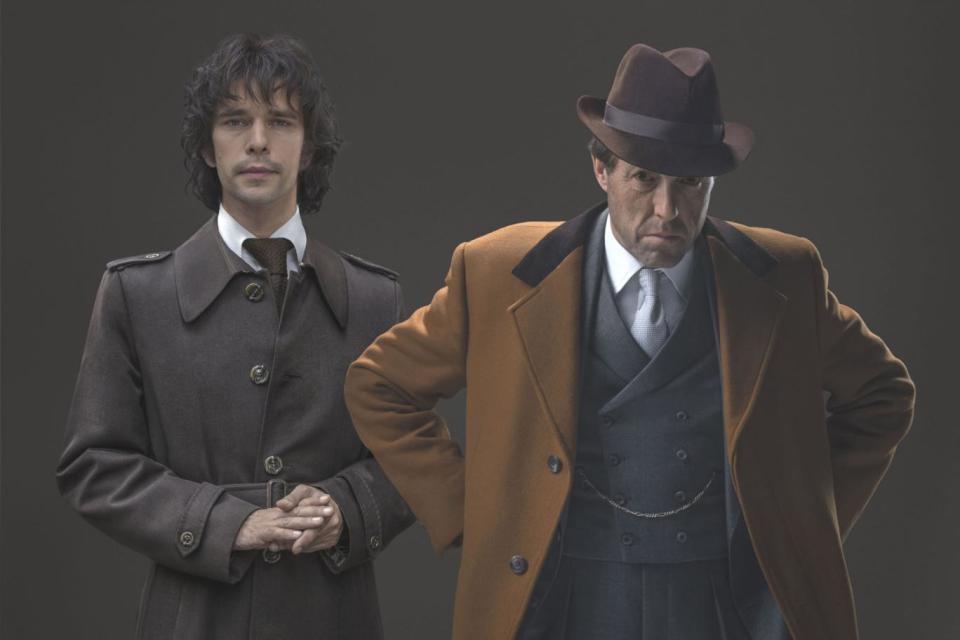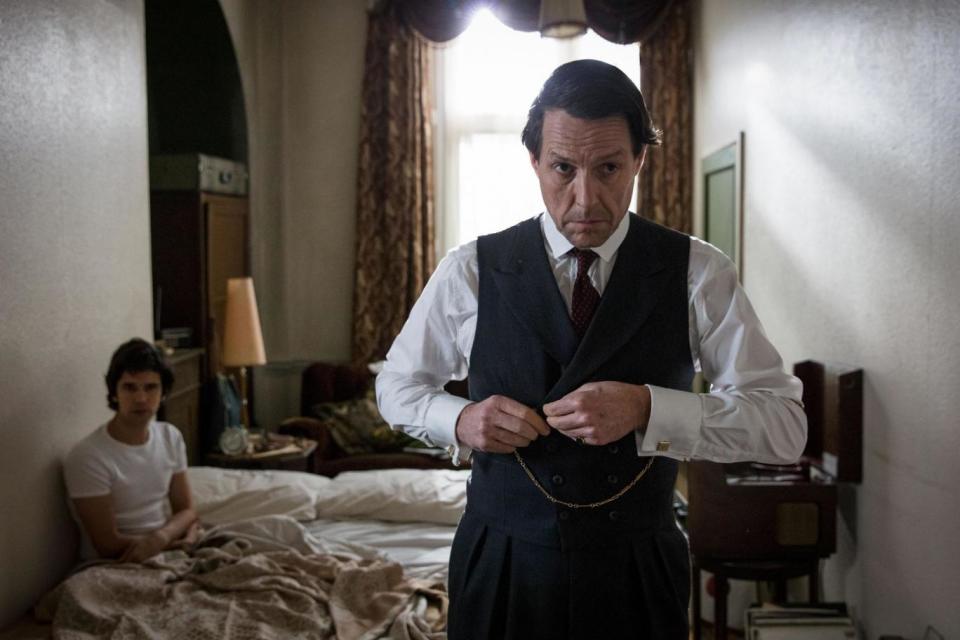Weekend TV: A Very English Scandal and Patrick Melrose

There has been some blowback over the performance of Hugh Grant as Jeremy Thorpe in A Very English Scandal.
The reaction came in two stages. First, the excitement at discovering that Grant could act. Second, a correction: of course he can act. He has always been able to act. So why the fuss?
It’s true, of course. Grant has always been a trouper but until recently he has been imprisoned by handsomeness, an affliction he bore with skill in romantic comedies.
Audiences love those films, critics don’t (The same rule applies with greater force to Grant’s sometime co-star Andie Macdowell, still being forced to apologise for how she said “Is it still raining?” in the damp closing scene of Four Weddings and A Funeral).

Grant showed the full range of his comic abilities — now including self-parody — in Paddington 2. But his Thorpe is something else. It isn’t exactly an impersonation. Grant isn’t gaunt enough for that. But he has British bottom teeth — who knew? — and manages to add a note of paranoid cruelty to the politician’s glad-handed arrogance, as he melts in an angry cardigan beneath a mocking crown of Vitalis.
This week, Ben Whishaw’s quivering stable boy, Norman Scott, is to the fore, as Thorpe orders his fumbling associates to assassinate him. Whishaw’s Scott is mentally vulnerable but likeable and open, even as he is being seduced by lusty Gwen, the village nympho (Eve Myles). It’s all done with such a light touch that you can (almost) forget that the story is a political scandal about attempted murder, which was covered up during a time when homophobia wasn’t just tolerated, it was the law. It’s a matter of tone, and between them director Stephen Frears and writer Russell T Davies have arrived at a place which is almost Ealing.

Part three of Patrick Melrose is based on Some Hope, the Edward St Aubyn book about the party attended by an appalling Princess Margaret (Harriet Walter). It’s a beauty. We’re now in 1990, and Melrose (Benedict Cumberbatch) is fresh out of the psychiatric ward, off the drugs but unconvinced about the merits of Narcotics Anonymous. “I’ve given up everything, and taken up nothing,” he says, flatly. The broad brushstrokes of the tale concern the unrelenting terribleness of the party guests, neatly summarised by Melrose as “snobs, social climbers, museum pieces”. They are, by and large, snivelling hypocrites, adrift on icebergs of their own self-importance, and the party serves as a hollow reminder of the cruelties of Patrick’s childhood. “They’re the last Marxists,” Patrick’s friend Johnny (Prasanna Puwanarajah) tells him. “The last people to believe class is a total explanation.”
It’s a carefully constructed episode, with scarcely a second wasted. That scene where Patrick makes a pot of tea, and arranges the sugar into little lines? It has an echo later on. The hallucinated gecko on the bedside table? That will be explained. In terms of the story, this marks the point where Patrick begins to eschew self-obliteration, to try and move beyond cynical isolation. As a strategy, it’s not without its risks.
The danger, Patrick tells Johnny, is that “without bitterness, spite, sarcasm, snobbery and self-loathing, there might be nothing left.”
Pick of the day
Modern Family- Sky One, 8.30pm
The mockumentary about the everyday life of an extended family in suburban Los Angeles reaches the end of its ninth, and penultimate, series. Gloria (Sofia Vergara) is preparing for Joe’s birthday by ruining his hair while Manny (Rico Rodriguez) gets ready to go on a cross-country jaunt.
Over at the house which Cam (Eric Stonestreet) and Mitch (Jesse Tyler Ferguson) share they are having to look after Cal, Pam’s son, who is something of a man-mountain, which means hugs tend to evolve into wrestling bouts.
Much of the episode’s comedy springs from the Hero-Con that Mitch and Phil (Ty Burrell) attend, dressed as their favourite characters from the fantasy show Clash of Swords. Mitch fully embraces his inner nerd, but Phil causes something of a stir for other reasons. There’s a great turn from Gloria’s nemesis, Dr Donna Duncan (Jane Krakowski), who is throwing an elaborate dinosaur party next door.
As season nine of the award-winning comedy draws to a close there has been some speculation about what the future holds, and how the show might renew itself for one final run. This episode delivers a few pointers.
Screen time
Generation Grime - Sky Arts, 10pm
This exhaustive documentary serves as an effective primer for those whose exposure to the London-born musical genre is limited to a passing knowledge of Stormzy, but it goes deeper too. There are interviews with most of the main players, and some fierce early footage which conveys the excitement of the underground musical movement more powerfully than the crossover hits.
Stylistically, grime followed from garage, but was more DIY, often being recorded on home computers by non-musicians. Dizzee Rascal, who took a pop version into the charts, says its dangerous image is exaggerated: “There’s episodes of EastEnders that are as bad as any grime song, and kids are watching that.”
What to Watch/Capital Conversation - Sunday, London Live, from 5pm
Now for the story of a wealthy family who lost everything and have returned for a fifth series of Arrested Development. Jessica Walter and Alia Shawkat, who plays Maeby Fűnke, appear on What to Watch to talk about the jinxed Bluths.
Then Capital Conversation meets entrepreneur Renée Elliott.
Comedy from Merton to Enfield - London Live, 8pm
Get the District line from Wimbledon, change at Earl’s Court, take the Piccadilly line, and that’s you sorted. That isn’t much material to fill half-an-hour of TV — and there’s a double-bill of this series — so it features a brief history of comedy, rather than brief travel information.
The opening episode meets a comedian whose side-project will echo around pubs this summer, as the Three Lions perhaps record a plucky victory over international behemoths Panama. David Baddiel is part of the generation of comedians who were dubbed the “new rock ’n’ roll” and his career is reviewed first. The second episode analyses the chameleonic Paul Whitehouse, owner of 53 per cent of the nation’s comedy catchphrases.
Set the box
How Wars Begin - BBC Parliament, Sunday, 8pm
Historian AJP Taylor delivered these six talks — Sunday to Friday — straight to camera in 1977. He looked at the history of modern warfare from the French Revolution through to the Second World War, via Crimea, the Franco-Prussian war, the First World War and the Cold War. The episodes are followed with talks by Steve Richards, who borrowed Taylor’s immediate style.
Jonathan Meades on Jargon - BBC4, Sunday, 10.30pm
As a TV presenter, Jonathan Meades, above, is unusual because he uses language. Actual words, arranged in order. Here he advocates received pronunciation as an engine of social change. Speech, he says, has become “a self-conscious badge of identity”. The film was originally called Matrix-hubbing Performative Pain Badgers. Perhaps it still is.

 Yahoo News
Yahoo News 
